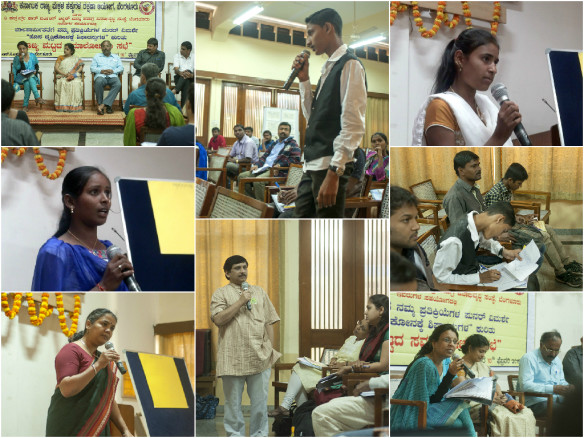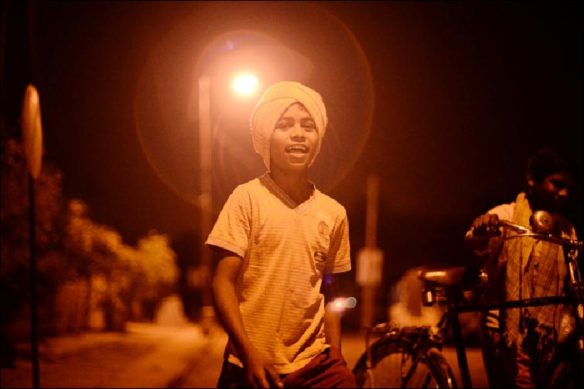Two State level consultation meetings based on Child Labour and Child Participation held
Posted on February 12, 2015
Two State level consultation meetings based on Child Labour and Child Participation were held in Bangalore on the 10th and 11th February, 2015. These meetings were initiated by Karnataka State Commission for Protection of Child Rights (KSCPCR) and facilitated by The Concerned for Working Children (CWC) as part of the celebration of the 25 years of UNCRC. CWC was the technical partner of the programme, who held the responsibility for designing the thematic content and session plan, identified the resource persons for the event and also conducted the entire workshop with inputs from the KSCPCR and the funding support by the financial partners – Integrated Programme for the Development of People (IPDP) and Gilgal Charitable Trust (GCT). These meetings were held to consolidate recommendations from various organizations which strive for protecting child rights and submitting these recommendations to the Government of Karnataka to help the creation of policies that affect children. Children from various parts of the state were also part of the consultation process.
Child Labour in Focus
The consultation meeting on child labour was aimed at developing new perspectives on the issue and re-looking at the present approaches adopted towards holistically addressing child labour.
Four speakers, gave deep insights on the challenges of approaching and addressing the problem of child labour. Arlene Manoharan, The Centre for Child and the Law (CCL), National Law School of India University (NLSIU) discussed about the criminalization of child labour and spoke about how various laws meant to protect children and rehabilitate them have in turn victimized them. Her recommendations included seeking professional expertise to represent working children produced before the law and a shift in attitude while addressing child labour issues from being a legal centric process to a child centred and friendly process. Shivaraje Gowda, member, KSCPCR, discussed the schooling of working children and then threw light on the challenges in running the National and State Child Labour Project (NCLP & SCLP) schools. His recommendations included the introduction of a monitoring and evaluation processes of registration of the NCLP and SCLP schools and also stressed on having an integrated approach of various educational programmes intended for children that are catered to them in piecemeal. That would also mean, that the labour department and the Sarva Shiksha Abhiyaan scheme to come together to address the educational needs of working children.
Father George Matthew of BOSCO discussed about the conditions of working children after the age of 14 and made recommendations for the formalisation and mainstreaming of vocational training for working children above the age of 14. Ganapathi MM of CWC, helped examine the solutions to child labour while approaching it from the perspective of child rights. He explained how the decentralisation of governance can help address child labour by addressing the root causes of child labour.
Child Participation in Focus
A consultation meeting was held to holistically understanding child participation and its effective implementation with the objective to protect the rights of the child as enshrined by the UNCRC.
Four representatives of various child rights organizations emphasised on the need for child participation in arenas pertaining to them and also expanded on the issues chid rights organisations faced while encouraging child participation. Kavita Ratna, CWC, explained how effective participation of children in local governments transforms not just the lives of children but also the lives of the adults around them. She spoke about children’s participation in local governments and how it is fundamental for children to assert their citizenship. She also enlightened the audience of the positive impacts on children, adults, governments and communities where such accountability had been established and recommendations to ensure and enhance the participation of children in local governance in both urban and rural areas.
Venkatamma from Mahila Samakhya, spoke of how her organisation collectivised and helped adolescent girls in Hadagalli taluk, Bellary district. Her recommendations included aspects to strengthen and help enable the participation of marginalised adolescent girls. She also emphasised the importance of accurate statistics on adolescent girls and women in each village. An adolescent girl then shared her experience of gaining confidence by being a part of one of such girls’ groups.
Sheila Devaraj of Association for promoting Social Action (APSA), discussed the issues faced by children belonging to the migrant communities and the conditions of migrant communities in Bangalore. Children from the migrant communities that APSA works with explained the issues that they faced on a day-to-day basis and the conditions they are forced to live in. Her recommendations stressed on the need to create a worker facilitation centre to be established, establishing tent schools under the Sarva Shiksha Abhiyaan scheme, identity cards for their parents (camps for Aadhaar enrolment) and platforms for children to share their issues with the councilors of their area.
Nagasimha G Rao of Child Rights Trust (CRT), who is also a member of the Right to Education (RTE) task force, explained some of the challenges faced by disabled children and the issues faced while providing facilities to these children in mainstream areas. His recommendations included the sensitisation of schools, other educational institutions and public spaces to have disabled friendly infrastructure and facilities, teachers to cater to students of special needs and a shift in attitude towards the children with special needs to mainstream them.
All speakers elucidated on the conditions of the marginalized children to highlight the fact that it is their voices that have to be heard – to help bring a change in their world.



